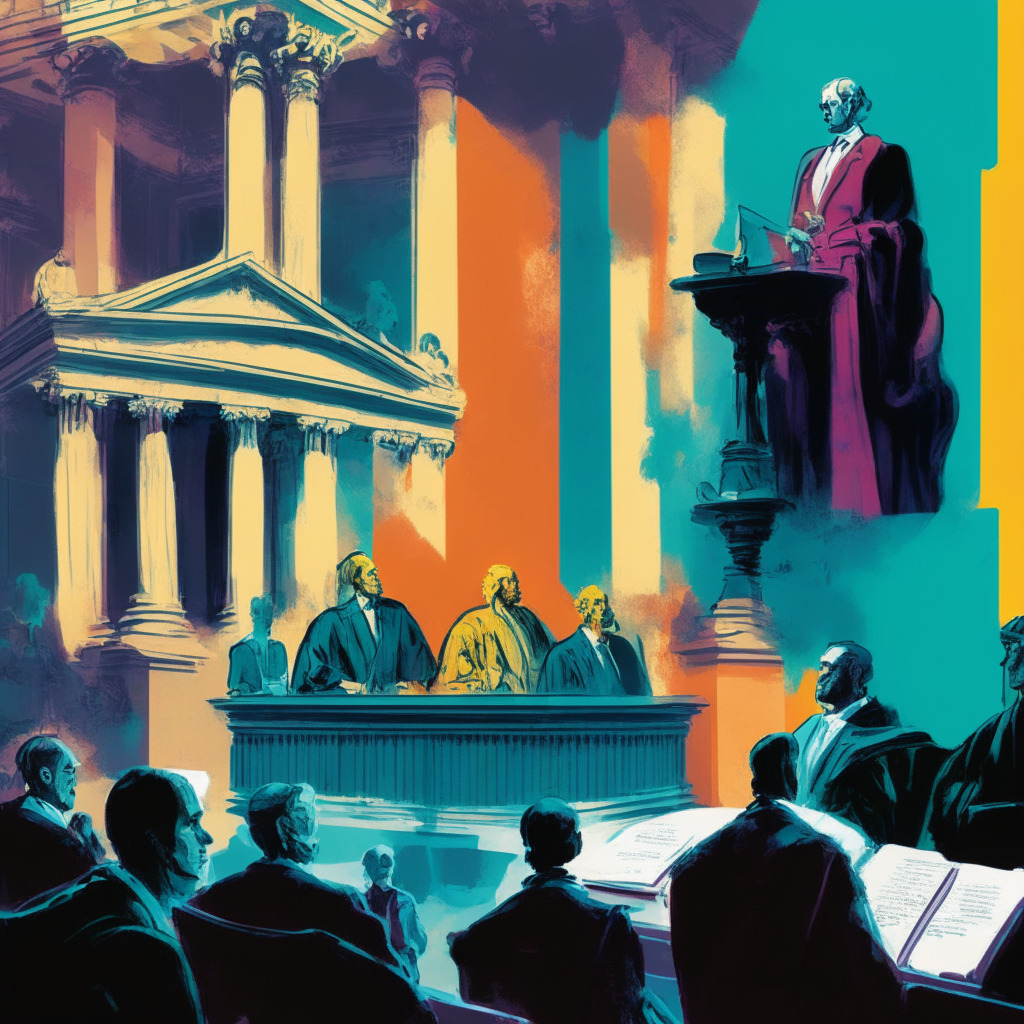US Senators Cynthia Lummis and Kirsten Gillibrand are to propose a new legislation known as the ‘Responsible Financial Innovation Act’, aimed at regulating cryptocurrencies and digital assets. The bill plans to classify most cryptocurrencies as commodities and enforce crypto exchanges to store consumer assets in third-party trusts, enhancing security. Critics argue it may also create unintended consequences.
Search Results for: Cynthia Lummis
Senator Lummis Leading Crypto Regulation Revolution: Key Advancements & Challenges Ahead
Senator Cynthia Lummis and Kirsten Gillibrand are co-sponsoring the Responsible Financial Innovation Act, aiming to create a “robust legal framework” for digital assets in the U.S. amidst tensions between regulators and crypto firms. The bill seeks to define digital assets as commodities or securities and impose requirements on stablecoin issuers.
Bitcoin: A National Security Tool & Energy Stabilizer – Senator Lummis Leads the Way
Senator Cynthia Lummis discussed the importance of Bitcoin for U.S. national and energy security, upcoming cryptocurrency legislation, and addressing concerns around debt ceiling and national defense. She aims to draft a comprehensive cryptocurrency legislative measure alongside Senator Kristen Gillibrand to drive positive change in the industry.
Bipartisan Battle for Crypto: A Deep Dive into U.S. Digital Asset Regulation
Senators Kirsten Gillibrand and Cynthia Lummis have introduced a new crypto bill, the Responsible Financial Innovation Act, aimed at addressing regulatory ambiguity in the US cryptocurrency industry. This legislation could shift the oversight of most digital assets from SEC to the Commodity Futures Trading Commission.
Redefining Boundaries: SEC, Coinbase Lawsuit, and the Call for Crypto Regulation Reformation
U.S. Senator Cynthia Lummis and crypto experts assert that the SEC’s examination of crypto trading platforms, like Coinbase, as unregistered securities exceeds their jurisdiction. The SEC’s authority question, they believe, should rest with Congress. Much debate exists around immediacy and breadth of crypto regulation, with an emphasis on establishing comprehensive, globally mindful approaches to build trust in the market.
The SEC vs Coinbase: A Power Play Redefining Crypto’s Regulatory Landscape
Senator Cynthia Lummis filed an Amicus Brief supporting Coinbase’s initiative to dismiss the SEC lawsuit, arguing the SEC is using its lawsuit to control the growing cryptocurrency sector, bypassing Congress’s role. The SEC’s approach could bring digital assets under its scope, categorizing them as securities and bypassing other agencies’ authority, which critics regard as overstepping its jurisdiction.
Roadmap to Regulations: Unveiling the U.S. Senators’ Bill for Comprehensive Crypto Laws
U.S. Senators Cynthia Lummis and Kirsten Gillibrand unveiled a revised draft for comprehensive crypto regulation, marking an evolution from a previous draft penned a year ago. The bill addresses decentralized finance definition, anti-money laundering provisions, custody rules and grants the CFTC decisive control over crypto issuers, alongside defining roles for the SEC.
Exploring the Impact of the Responsible Financial Innovation Act on Cryptocurrency Future
US Senators Cynthia Lummis and Kirsten Gillibrand plan to reintroduce the Responsible Financial Innovation Act, a regulatory bill for digital assets. The legislation aims to define the SEC and CFTC roles in regulating digital assets and enhance consumer protection, potentially safeguarding against future market crashes. However, there are fears that this could suppress innovation in the sector.
Upcoming Crypto Bill: Balancing Innovation and Consumer Protection in the US Market
US Senators Cynthia Lummis and Kirsten Gillibrand are working on a bipartisan effort to introduce comprehensive regulations for cryptocurrencies, aiming to provide clarity within the digital asset sector. The forthcoming crypto bill intends to define cryptocurrencies, potentially remove the “security” label, and impose a universal ban on algorithmic stablecoins. Challenges remain in balancing innovation and consumer protection.
Biden’s 30% Bitcoin Mining Tax: Balancing Environmental Concerns and Industry Growth
Senator Cynthia Lummis strongly opposes the Biden Administration’s proposal for a 30% tax on electricity for Bitcoin miners. Critics argue this could drive the industry offshore, while supporters claim it addresses environmental concerns. The debate highlights complexities in regulating the digital asset industry and balancing consumer protection, sustainability, and innovation.
Biden’s Proposed 30% Bitcoin Mining Tax: Impact on National Security and Clean Energy
Sen. Cynthia Lummis addressed concerns over President Biden’s proposed 30% excise tax on Bitcoin miners, stating it could negatively impact both Bitcoin mining and national security. Although lawmakers remain skeptical due to criminal activity associations, Lummis emphasizes the importance of promoting Bitcoin mining in the US for energy security and potential environmental advantages.
Biden’s 30% Crypto Mining Tax: Innovation Killer or Eco-Friendly Move? Pros & Cons Explored
Senator Cynthia Lummis opposes the proposed 30% tax on cryptocurrency miners in the Biden Administration’s budget for 2024, citing environmental benefits. The proposed tax has sparked debates surrounding innovation, blockchain development, and consumer protection, with concerns it may hinder cryptocurrency adoption in the US.
Senators Pursue Clear Crypto Legislation: Balancing Investor Protection and Innovation
Senator Cynthia Lummis and Congressman Patrick McHenry aim to develop legislation clarifying the state of cryptocurrency market structure in the U.S. The proposal focuses on decentralized exchanges, suggesting a strictly voluntary registration process, fostering innovation, and ensuring the U.S. remains competitive in the global financial services market.
US Crypto Legislation: Balancing Innovation and Regulation in the Race for Legitimacy
The US crypto legislation might come together soon, fueled by optimism from Congressmen like Patrick McHenry and Senator Cynthia Lummis. Yet, the potential impact remains uncertain, with possible increased legitimacy, investment, and resistance from traditional banking institutions, highlighting the need for a balance between regulation and innovation.
Failing or Succeeding? Evaluating The Blockchain Association’s Influence on Crypto Legislation
The Blockchain Association, a leading crypto trade association, continues to face skepticism and regulatory hurdles despite its five-year existence. With progress impeded by the fall of FTX and reduced support from congress members, the association’s efforts to pass comprehensive crypto legislation remain unsuccessful. Notwithstanding these setbacks, it has managed some victories in mitigating impacts of proposed regulations and supporting member companies. However, the future still presents significant obstacles, and crypto lobbyists are urged to remain humble about their “achievements.”
Future of Crypto Regulation: Senator Sherrod Brown’s Stand and Potential Impacts on the Industry
Senator Sherrod Brown’s stern views on crypto industry as riddled with deceit and exploitation is affecting the future of crypto regulation in the U.S. Brown directs the Senate Banking Committee, highlighting troubling aspects like inadequate disclosure, interest conflicts, and high-risk bets in the industry. Without Brown’s approval, comprehensive crypto market oversight seems unlikely.
Exploring the Political Spectrum: The Rising Influence of Bitcoin Mining and Cryptocurrencies
Senator Ted Cruz endorses Bitcoin, highlighting its potential in bolstering energy grid resilience—an advantage in emergencies, such as the recent Texas extreme weather. The stance reflects the growing influence of digital currencies, despite potential hurdles and economic turbulence.
Exploring the Forces Shaping Bitcoin’s Spiraling Rise Above $27,000: A Market, Technical, and Global Outlook
“Bitcoin (BTC) has surged above $27,000, a jump many credit to Grayscale’s recent legal victory to turn its Bitcoin Trust into an ETF. Global cryptocurrency market capital grew roughly $50 billion in a day, raising hopes for future growth. Factors such as increasing acceptance of crypto by countries like Netherlands and endorsements by US figures further strengthen the market’s legitimacy.”
Legal Experts Throw Weight Behind Coinbase: A New Twist in Crypto Regulation?
“A group of legal experts specializing in securities law have aligned with Coinbase in its legal battle against the U.S. Securities and Exchange Commission. They stress the importance of established ‘investment contract’ definitions and the intricacies of federal precedents, like the Howey test. This case highlights the existing regulatory uncertainty in the burgeoning crypto industry.”
Navigating the New Terrain: Implications of the NDAA Bill on Crypto Privacy and Regulation
The U.S. Senate has passed the National Defense Authorization Act, imposing new regulations on the digital asset world, including privacy coins and crypto mixers. The regulations aim to stem crypto-related fraud and are expected to force an elevation in crypto regulatory standards, obliging authorities to crack down on anonymous crypto transactions. The discourse reflects the conflict between privacy freedoms versus governance needs in the crypto sector.
2024 NDAA and Crypto: Striking Balance between Oversight and Innovation
The United States Senate has passed the 2024 National Defense Authorization Act that targets crypto mixers, crypto trading institutions, and anonymous coins. The bill draws provisions from the Digital Asset Anti-Money Laundering Act and the Responsible Financial Innovation Act for improved oversight on crypto-based activities. Key measures include examination standards for crypto, preventing FTX-style events, and studies to curb anonymous crypto transactions.
U.S. Senate Tightens Crypto Regulations in NDAA 2024: A Necessity or Threat to Blockchain Freedom?
The U.S. Senate’s passage of the 2024 National Defense Authorization Act introduces tighter regulations for financial institutions engaged in crypto trading, marking a significant legislative shift. The bill targets crypto mixers and “anonymity-enhancing” crypto assets and aims to strengthen compliance with money laundering and sanctions laws.
Wyoming’s Revolutionary Leap: State-backed Stablecoin Project and a Hefty Paycheck Higher than the Governor’s
The US state of Wyoming plans to hire an executive director for a groundbreaking stablecoin project, a commission introduced after the Wyoming Stable Token Act was recently approved. The commission’s authority allows it to issue a US dollar-pegged stablecoin in Wyoming, redeemable for dollars in the state’s bank account. With desired qualifications including blockchain expertise and understanding of Wyoming’s legislative operations, the Commission aims to issue a stablecoin by end of 2023.
Coinbase CEO Meets US Lawmakers: Future of Cryptocurrency Legislation
The upcoming meeting between Coinbase CEO and US lawmakers could greatly influence cryptocurrency legislation. Topics include impacts of crypto technology on security, privacy, and climate, as well as crypto legislation. This meeting arrives amidst legal disputes and mixed opinions on potential regulations possibly hindering innovation and transaction privacy.
Ripple Case Verdict: A Call for Clear Crypto Regulations and its Impact on the Industry
“The recent court ruling established that the Ripple-associated token XRP should not be considered a security. This highlights an urgent need for Congress to establish a clear regulatory framework for digital assets. Regulatory strides could unlock economic growth and enhance financial inclusivity, but the full potential of the crypto industry depends on well-thought-out regulations and proactive policymaking.”
Winklevoss Warns Democratic Crypto Stance Could Cost Youth Vote and Elections
Crypto billionaire Cameron Winklevoss warns that Senator Elizabeth Warren and SEC Chairman Gary Gensler’s pushback against crypto may alienate potential Democratic supporters, particularly Millennials and Gen Z voters. As younger generations increasingly embrace crypto’s potential applications and investments, the growing regulatory scrutiny could negatively impact their affinity towards the Democratic party.
Crypto Wars: Democrats Risk Alienating Youth Voters with Anti-Crypto Stance
Crypto billionaire Cameron Winklevoss warns that the war on cryptocurrencies led by U.S. Senator Elizabeth Warren and SEC Head Gary Gensler could alienate Millennials and Gen Z, potentially impacting Democratic voter support. Not all Democrats share anti-crypto sentiment, as the debate around regulations continues to shape the political landscape.
Crypto Billionaires Shaken by SEC Crackdown: Balancing Innovation and Regulation
Crypto billionaires face significant losses amid the SEC’s crackdown on Binance and Coinbase, impacting the net worths of Changpeng Zhao and Brian Armstrong. Regulatory compliance challenges may overshadow factors supporting Bitcoin’s resurgence, highlighting the delicate balance between fostering crypto innovation and investor protection.
Upcoming Hearing on Digital Assets: Balancing Clarity, Regulation, and Innovation
The House Financial Services Committee has announced a hearing on June 13th, titled “The Future of Digital Assets: Providing Clarity for the Digital Asset Ecosystem.” Amid an SEC crackdown, Republican lawmakers propose a draft bill for clearer crypto guidelines, seeking a balance between investor protection and innovation in the rapidly evolving digital asset ecosystem.
Crypto Mining Tax Shelved: Balancing Innovation, Regulation, and Sustainability Debate
The proposed Digital Asset Mining Energy excise tax (DAME) on cryptocurrency mining is absent from the recent US debt ceiling deal, stirring debates. While proponents argue DAME could generate revenue and promote eco-friendly practices, critics warn against stifling the growing industry with taxes.
Debt Ceiling Agreement Blocks Crypto Mining Tax: A Win for the Industry or Environmental Setback?
The recent U.S. debt ceiling agreement has notably blocked the proposed Digital Asset Mining Energy (DAME) excise tax, preventing a 30% tax imposition on cryptocurrency mining firms. This outcome, seen as a victory for the crypto industry, has sparked debates around the environmental impact of crypto mining operations and the importance of addressing energy consumption concerns for a sustainable future.
Digital Asset Mining Tax: Hindering Innovation or Addressing Energy Concerns?
The proposed Digital Asset Mining Energy excise tax (DAME) has divided opinions between those who view it as a hindrance to cryptocurrency industry innovation and those believing it addresses energy consumption concerns. Meanwhile, cryptocurrency regulation legislation, such as the Responsible Innovation Act and stablecoin bills, continue to evolve, shaping the future landscape of digital assets.































